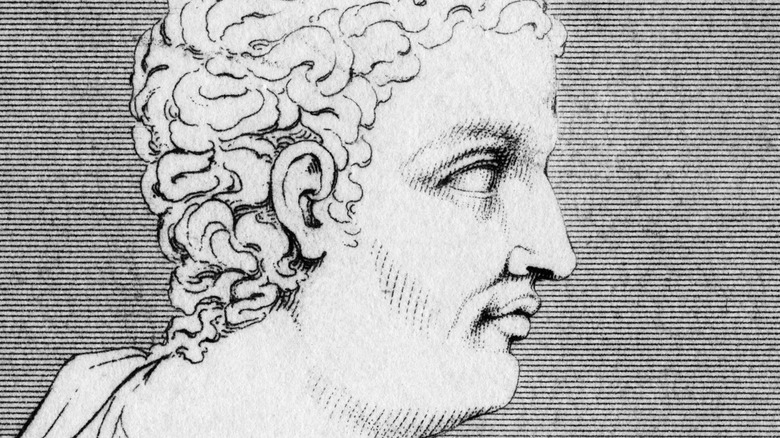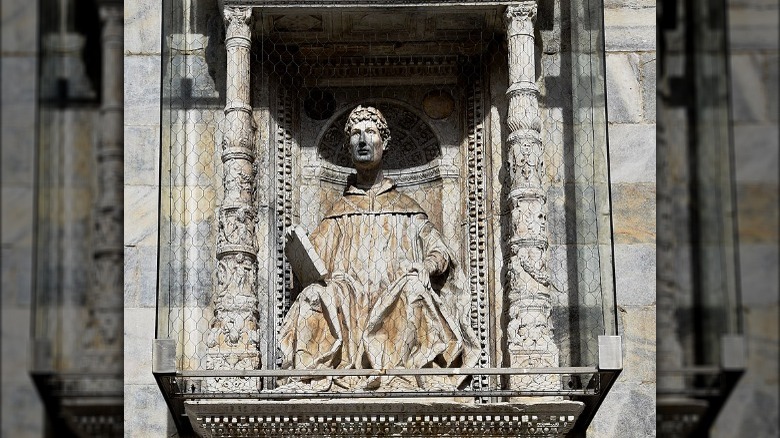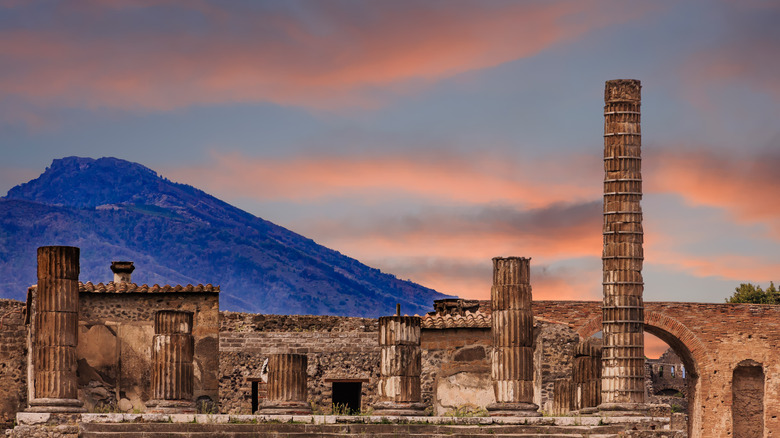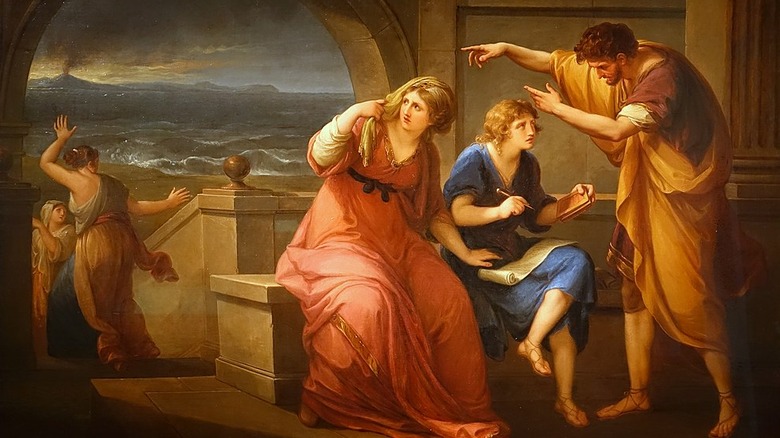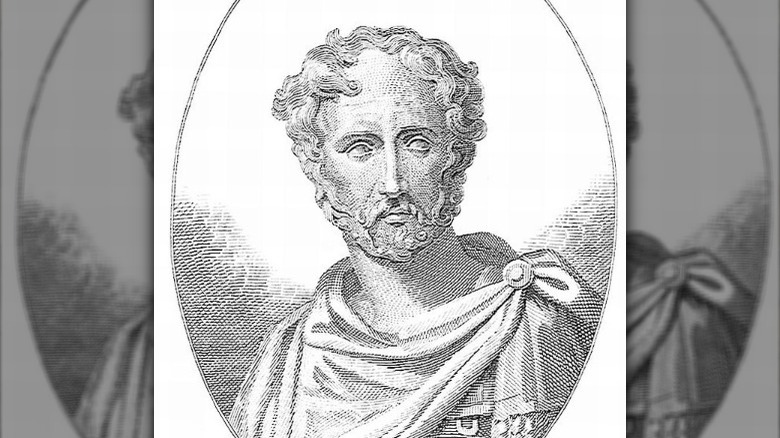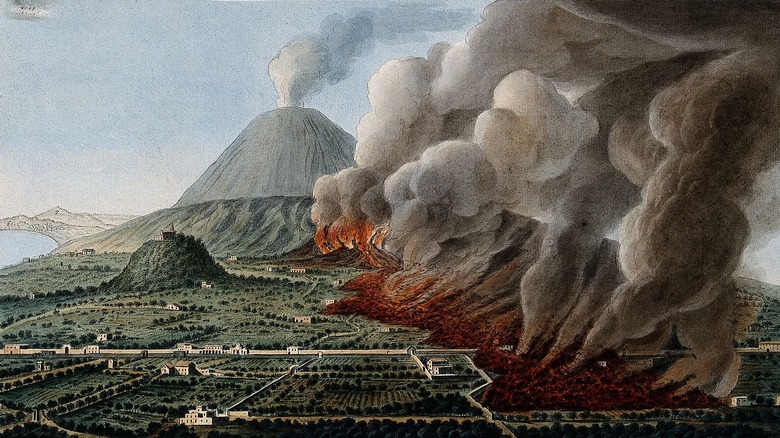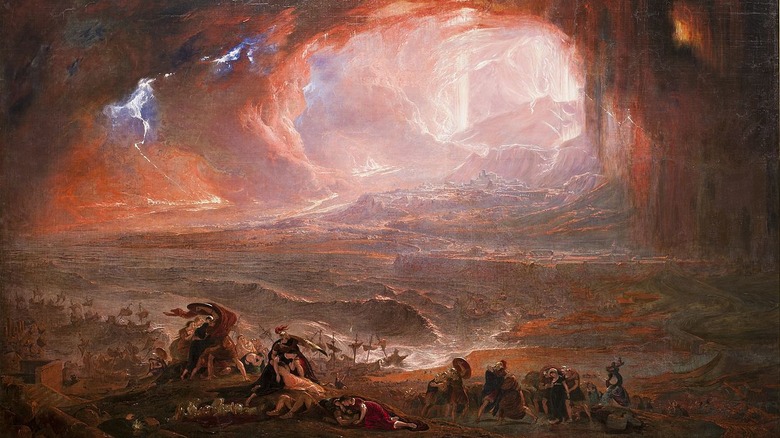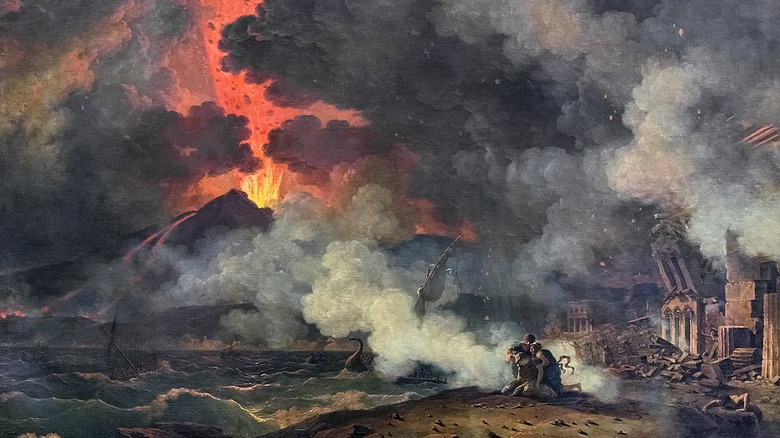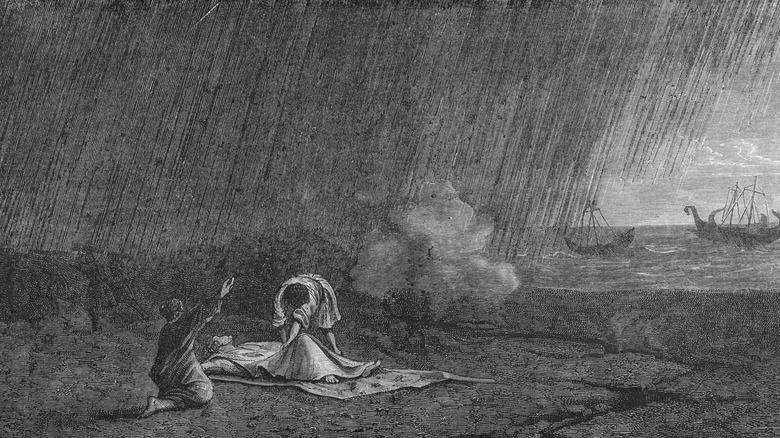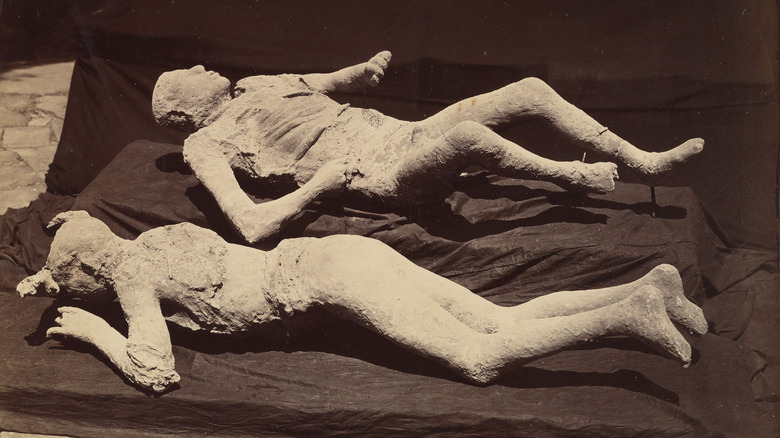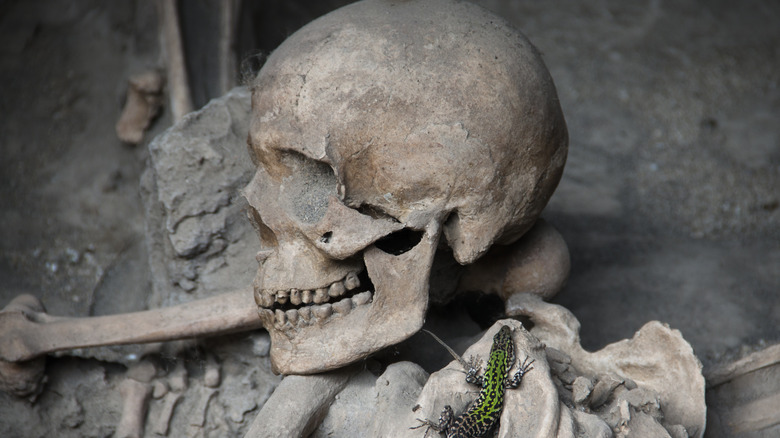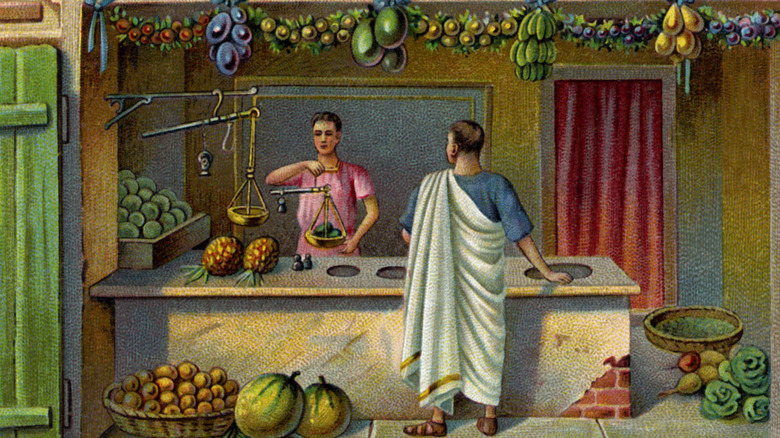The Story Of The Only Written Eye-Witness Account Of Pompeii's Destruction
You've probably heard of the destruction of Pompeii. After all, it's a pretty famous tale: On a perfectly normal August 24 in the year 79 A.D., Mount Vesuvius suddenly erupted, despite generations upon generations of Italians feeling perfectly safe in the area due to the volcano's dormancy. But on that day, the volcano spewed out clouds of ash, and all of that came raining down on the cities situated nearby. Pompeii was one of those towns, the city and its inhabitants buried in ash, killed by the calamity.
It's a harrowing tale, and one that's been told pretty well through all of the artifacts found many years later at the site. Really, the city proved to be something of an archeologist's dream – an entire city perfectly preserved at the moment it was destroyed. Thousands of human remains were found exactly where they died, art and valuables have been dug up, and even some baked goods have been preserved by the ash, looking pretty similar to how they would have back in the first century A.D.
But when it comes to written accounts of the tragedy, well, there aren't a whole lot of those available. Maybe that's not surprising, considering how deadly this volcanic eruption was. That said, there isn't a complete lack of records; rather, historians do have access to one particular eyewitness account of the eruption of Mount Vesuvius, and it's the one that Pliny the Younger left behind.
Who was Pliny the Younger?
While it's definitely interesting to really dig into Pliny the Younger and solely his account of the destruction wrought by Mount Vesuvius, it's also worth noting that he was only 18 at the time; in short, he's done more than write one thing (even if it is a work with immense historical significance). So, what were those things, in a nutshell?
Well, the New Yorker notes that he was the nephew of the rather esteemed Pliny the Elder, a military man and naturalist best known for his "Natural History" – a massive compilation of his observations of everything from bee hygiene to the general beauty of nature. So Pliny the Younger was poised to leave his own mark on the world as a wealthy Roman academic.
According to Britannica, he carved his path in the courtroom, working as a lawyer and rising through the administrative ranks to some of the highest positions in Rome. From there, he worked closely with a bunch of different emperors over the years, and with that experience under his belt, he made the move toward writing. His books were ultimately a compilation of his letters, but they ran the gamut when it came to topics: literature, philosophy, science, business, but especially politics, leaving behind descriptions of just about every important Roman official he came into contact with.
Pompeii wasn't the only city affected by the eruption
To really get a sense of how exactly this story works, it does help to get a bit of context out of the way. Because while Pompeii – the city frozen in time, buried in ashes – is certainly the most famous city affected by the eruption of Mount Vesuvius, it wasn't the only one.
After all, a volcano isn't picky about where it affects. Another major city hit by the destruction is mentioned by the New Yorker as the city of Herculaneum. Reportedly a rather decadent city filled with art and brothels (via History), Herculaneum was initially spared from the destruction by a fortuitous gust of wind, only for toxic gasses and ashes to later cover the city. The people tried to seek shelter in covered vaults, though it's possible that only made their deaths worse; rather than extreme heat, they were probably killed slowly by asphyxiation.
Then there are the cities that Pliny the Younger actually made mention of in his own account. Stabiae was a small, quiet port town that was blanketed in toxic gas; it would also be the last place Pliny's uncle would see. And Pliny himself might have survived the eruption by riding it out near the city of Misenum (which, granted, did see its own fair share of terror).
Pliny and his family weren't all that concerned about the eruption
In the wake of a volcanic eruption (or any major natural disaster, really), you'd probably think that the most natural reaction would be some sort of panic, right? After all, you're faced with the very real possibility of death; that seems like the sort of time where you freak out just a little before maybe coming to terms with just what's happening. Point being: you probably wouldn't just act like it's a normal day.
Unless you're Pliny the Younger and his family. According to Pliny's account, he and his mother (Plinia, per the New Yorker) were staying with his uncle (Pliny the Elder) at the time of the eruption of Mount Vesuvius, and the whole affair sounds really casual at the start. Pliny explains that his uncle had been going about his day perfectly normally, taking some time to lie out in the sun and then catching up on some reading. He didn't even take notice of the eruption immediately; rather, Pliny's mother pointed out the cloud of ash rising from Mount Vesuvius out in the distance. And his uncle didn't seem to be scared or concerned at all by this occurrence. On the contrary, he was apparently fascinated by it, thinking it was something "extraordinary and worth further looking into."
So he put together a ship and crew to go get a closer (yes, closer) look at the erupting volcano. He even extended an invitation for Pliny to join him – an invitation that Pliny decided to decline. Not so that he could get away from the volcano, but rather so he could have some time to get a little more work done.
Pliny painted his uncle as a hero
The beginning of Pliny's account of the destruction wrought by Mount Vesuvius makes his uncle out to be a renowned scholar – verbatim, he's referred to as "man of ... learning and research," in fact. And while Pliny the Elder's intellectual curiosity upon first seeing the cloud of toxic ash does support that initial image, his motives for heading out to the volcano pretty quickly changed.
Shortly after the eruptions began, Pliny the Elder got word from a friend whose wife was trapped in a villa at the base of Mount Vesuvius. He ordered even more ships to head into the middle of the disaster, his entire voyage changing from an intellectual pursuit to a philanthropic one. He intended to rescue as many people as he could from the chaos, and even in the face of black volcanic rock tumbling down into the ocean, he was said to have acted with "calmness and presence of mind."
Even as others began to panic around him, he seemed to try to calm their fears by acting as if nothing was wrong – he called for a bath and dinner, going about it with "cheerfulness, or at least ... with every appearance of it." Even upon seeing the fires of the volcano light up the night, he assured those around him that it was just the glow from abandoned, burning villages. That power of positive thinking couldn't save him, though, and having just barely started the rescue mission in earnest, Pliny the Elder was killed – most likely asphyxiated by the ash-filled air.
Things steadily got worse
Although Pliny the Younger began his account of the eruption by saying that he and his family weren't all too concerned by the black clouds of dust on the horizon, his view of the matter pretty abruptly changed.
Earthquakes were pretty common in that region of Italy, so no one thought too much of the shaking that was taking place in the days leading up to the eruption. Pliny was included in that, though things changed a lot when the earthquakes got worse: This wasn't an earthquake that shook you awake at night, but an earthquake that started flipping furniture. At that point, people knew it was time to go, and much of the town evacuated, only to find that an easy escape wasn't to be had. The shaking made it impossible to take chariots, no matter what people did to try and steady them.
In fact, even when the most horrific parts of the disaster were over, the earthquakes still continued, keeping tensions high as people remained on high alert, prepared for the worst.
Ashes and rocks fell from the sky
Once the worst of the disaster rolled around, the scene in Pompeii and the surrounding cities was nothing short of something you'd see out of a disaster movie. And that's really not an exaggeration.
Pliny explained in his account that his uncle likely saw all of it while sailing to rescue people stranded in their towns. Cinders were falling from the sky along with the ash, and pieces of blackened, burning pumice were even beginning to fall into the ships themselves, all while those same stones were piling up on the shore, making it impossible to really sail. And things only got worse from there. Homes began to fill with ash and stone – to the extent that people couldn't get out of the buildings, and many started tying pillows to the top of their heads, desperate for any sort of shield against rocks falling from the sky.
The scene near Misenum was only marginally better. Pliny explained that he and his mother had to constantly stay vigilant, brushing off the "heavy shower of ashes" that rained down onto them, lest they be completely covered by the stuff. (At the very least, there weren't actual rocks falling, too.) And by the time the danger had passed, the entire city looked like it had been blanketed "as if with snow."
People screamed in the dark
Imagine being in the midst of a natural disaster. Imagine fearing for your life, not knowing exactly how or when things might end. It's pretty bleak. But now add to that the constant sound of people shrieking and oppressive, pitch-black darkness. And that's basically the state of Misenum in Pliny's account.
All of the ash kicked up into the air by the eruption began to literally block out the sunlight, leading to darkness even more complete than the night. Pliny described it as he sat with his mother in an alley as the kind of dark you'd get with "a room when it is shut up, and all the lights put out" – darker than a cloudy day or moonless night.
But the rest of the town had their own opinions on it, because this wasn't a quiet night, by any means. No, it was the stuff of horror, filled with "the shrieks of women, the screams of children, and the shouts of men." Some called out for family; some called for a quick death. The pious begged the gods to show mercy, but a fair few began to doubt that the gods even existed at all. And a rumor even began to spread that "one part of Misenum had fallen," inciting a new panic of its own. This cacophony raged through this "endless night" before the dust finally settled, letting the sun shine again.
He was mostly concerned about his family
While there's definitely a level of morbid fascination with the horror and the terror described in an account of a natural disaster, there's also the more human aspect to think about, and it's something that's present in Pliny the Younger's account of the eruption. After all, he and his mother stayed behind while his uncle left on a ship to go investigate. Slowly becoming more aware of the true gravity of the situation, the two of them anxiously waited, uncomfortable with the idea of leaving the city while the fate of Pliny's uncle was still unknown. (A friend chastised them for seeming unconcerned, telling them that Pliny the Elder would've wanted them to escape with their lives).
Eventually, both of them did finally make an attempt to leave, though Plinia begged him to leave her behind and go on alone. She was old and would just slow down his escape; instead, she'd be happy enough to know that he managed to flee to safety. Of course, he refused to actually do that, instead doing what he could to keep them both safe – from both the volcanic eruption and the panicking crowds.
In the end, both of them managed to survive the destruction and waited for news regarding his uncle, only to get confirmation a few days later that his body had been found on a beach.
Pliny avoided a pretty gruesome death
Pliny the Younger managed to avoid the very worst effects of the eruption of Mount Vesuvius, and in doing so, he's the only person known to have left behind a record of the chaos wrought. But, at the same time, it means that he didn't quite know the worst of what happened. In that case, just what fate did he narrowly avoid?
As it turns out, a pretty horrific one. And one that involved a lot of heat. Smithsonian Magazine reported that the ash from the eruption preserved the position that people died in, basically making a mold that could be filled with plaster. Two victims received this exact treatment, showing exactly what they looked like in the moment of their death: hands and feet clenched in pain, one of the bodies appearing to be in the midst of writhing. Which is in line with their exact cause of death – thermal shock. Or, in plain terms, a sudden increase in temperature that caused their internal organs to completely shut down.
But that's not all. National Geographic explains that it got even worse. That sudden upward shot in temperature was likely enough to vaporize soft tissue and cause liquid in the brain to boil (with potentially explosive results). And if that wasn't enough, researchers found shards of what appeared to be glass left in the skull. Glass that was actually made of brain matter. Yeah, the heat might have liquified brains, which quickly cooled to create a pseudo-glass substance. Pliny was definitely lucky to have gotten out alive.
Archeological finds and Pliny the Younger's account
There's something about searching out legends that's really appealing to the human mind. After all, archeologists have spent years trying to find mythological sites like the famed city of Troy (via DW). Of course, Pliny's account of Pompeii's destruction isn't quite as mythical, but it's still cool to see when and how those archeological finds do line up with the written records. And in the case of Pliny the Younger's account, one of those points of interest has to do with his uncle. Pliny reported that his uncle left his home, sailing directly into the heart of the disaster where he was shortly killed by the toxic fumes spewed out by the volcano. But given that, it must mean that his remains were left somewhere, right?
According to Live Science, in the early 1900s, a bunch of skeletons were found in the ruins of a city near Pompeii – consistent with Pliny the Younger's accounts of his uncle's expedition – one of which was decked out in fancy jewelry. Speculation arose that it might be the remains of Pliny the Elder, but analysis on the jawbone of the recovered skull seemed to point in a very different direction. (The owner of the jawbone was too young and likely wasn't Italian). But the rest of the skull seemed to paint a different story, coming from someone of Roman descent who died sometime in their mid-50s – exactly Pliny the Elder's age at death.
So, where does that leave the theories? Per Haaretz, it's possible that the two fragments came from different people: Pliny and a man who was either a sailor or a slave.
Maybe he had it wrong
When you're an academic working with only a single account of an infamous event, it's easy to imagine why there might be some skepticism as to the validity of the source. After all, it's kind of hard to confirm the accuracy of a report when there just isn't anything to compare it to. So while Pliny's account of Pompeii's destruction is largely taken as true (History does take the date of the eruption he gave – August 24, 79 A.D. – as fact) there have been some finds that seem to contradict what Pliny claims.
Really, it's the date that's come into question over the years, and Reuters reports that there are a handful of archeological finds that seem to imply that the eruption took place in late October rather than late August. Excavations of Pompeii ended up revealing messages left on a partially renovated house, written in charcoal. Some of those messages included a date: October 17. In other words, after the supposed eruption. And given that charcoal writings wouldn't last long on a wall, it's unlikely that they were written the year before, which seems to mean that the eruption must have happened sometime after that October 17 date.
And there's a bit more, too. Autumnal fruits have also been unearthed during other excavations of the city, as have a number of braziers. Taken together, it might make more sense for the eruption to have happened a couple of months later than Pliny actually supplied.
